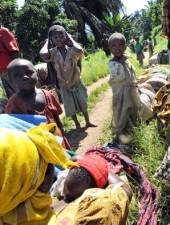As the world's attention turns to International Criminal Court (ICC) fugitive Joseph Kony, the court is preparing to issue its first judgment against another warlord, Thomas Lubanga, who has been charged with the recruitment of child soldiers in the Democratic Republic of Congo (DRC). For the millions of victims of the country’s successive wars, Lubanga is just one of many who are responsible for crimes on an astonishing scale. Congolese authorities must end the widespread impunity enjoyed by those who remain in positions of power in the government and military or violence and instability are likely to continue for years to come.
As one of the largest aid donors to the country, the United States is in a strong position to pressure the Congolese government to take more meaningful and effective action to reform its military and ensure war criminals are brought to justice.
The newly elected government faces a legitimacy crisis after November elections that were widely condemned by international observers, including the Carter Center, as lacking credibility. Secretary of State Hillary Clinton expressed her “deep disappointment” at the widespread irregularities, but soft statements like this do not pressure the Congolese authorities to commit to real democratic reforms, including reforming the security forces.
A clear link exists between impunity and the ongoing political turmoil. The Congolese political elite are free to act in their own interests, including using the military and police against the opposition and civilian protestors. Government security forces have reportedly detained opposition party members, journalists, and human rights defenders across the country and others have disappeared.
|
On February 16, Christians across Kinshasa gathered in churches for a special memorial Mass to commemorate a famous march that was held in opposition to the country’s former dictator Mobuto, and protest the recent electoral crisis. Police surrounded churches and threw tear gas inside to disperse parishioners—a response by the current president Joseph Kabila that many considered much harsher than that of his predecessor. |
Rampant impunity for war crimes contributes directly to the DRC’s ongoing instability. Congolese and other regional militias and criminal networks have operated for over a decade with little concern of being held to account. Over five million Congolese have been killed since the wars erupted and cycles of killings, rape, looting, and abductions have destroyed communities, disproportionately targeting women and children.
This remains the horrific reality in the eastern part of the country, where Secretary Clinton’s visit in 2009 directed much-needed attention to the plight of thousands of victims of sexual violence. Armed groups have responded to the recent political repression with increased attacks on civilians to express their discontent. Congolese army commanders—who include former rebel war lords integrated into the national army—have appeared more interested in enriching themselves through illicit mining and other activities in Eastern Congo than protecting the civilian population. Caught between ruthless militias and an army operating for its own gain, terrified civilians face continued acts of violence, exploitation, and abuse.
| The Child Soldier Protection Act restricts U.S. military assistance to foreign governments who use child soldiers in their militaries. President Obama has issued a partial waiver of the act to allow limited military assistance to DRC. The waiver claims the DRC government has tried to demobilize child soldiers, but these efforts have been hampered by the integration of former rebel and militia troops into government forces, that are now “plagued by the persistence of separate command structures.” |
|
For any military support to be effective, the Congolese army needs to be vetted to identify and remove perpetrators of serious crimes. One of the most shocking cases involves former rebel warlord Bosco Ntaganda, for whom the ICC has issued a warrant to arrest, but who is now a general in the Congolese army, and known to operate with criminal networks. U.S. Special Forces are now supporting several central African countries including the DRC to find Joseph Kony, the leader of the Lord’s Resistance Army (LRA)—a militia that has terrorized the region for more than 20 years. The ICC issued an arrest warrant for Kony in 2005, and the Obama administration announced it would support local efforts to locate him in 2011, but the U.S. has done little to support the warrant for Ntaganda.
Though important, ICC proceedings alone are clearly insufficient to address the complex underlying causes of Congo’s wars. A peaceful future depends on the Congolese government taking substantive action to address legacies of the past and the crimes that continue to be committed today.
Congo’s international partners, the U.S. leading among them, should hold the government to a higher standard of responsibility. Current aid should be made conditional on the implementation of wide-ranging national prosecutions and ending impunity for the likes of General Ntaganda. Bilateral military assistance should be contingent on the military adopting a zero tolerance anti-corruption policy, especially targeting the embezzlement of army salaries by higher-ranking officers, to ensure soldiers receive a living wage. Members of the security forces should be immediately tried and disciplined when found to commit crimes, especially against the civilian population.
As seen in the cases of Egypt, Libya, and now Syria, repressive regimes cannot be expected to reform themselves. Ending impunity is vital to keep the country from sliding further into authoritarian rule and to prevent the further suffering by the Congolese people. Instead of waiting for the next crisis, a clear message from Washington to Kinshasa on the need for accountability and reform is today more important than ever.
Sharanjeet Parmar is the DRC program director at ICTJ.
Photo: Langira, Walikale District, DRC - February 14, 2009: Personal belongings lie on the path as the entire community from Brazza village flee the horrific and brutal rapes and killings that they endure at the hands of the FDLR (Democratic Liberation Forces of Rwanda, or Interhamwe). Photo by Susan Schulman/Getty Images.
